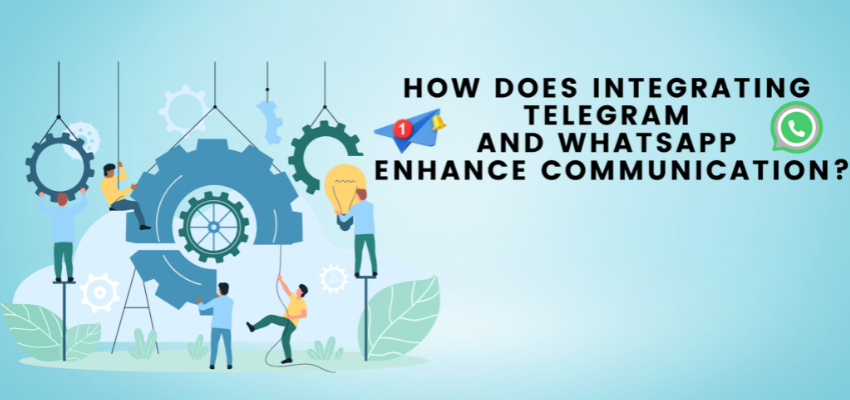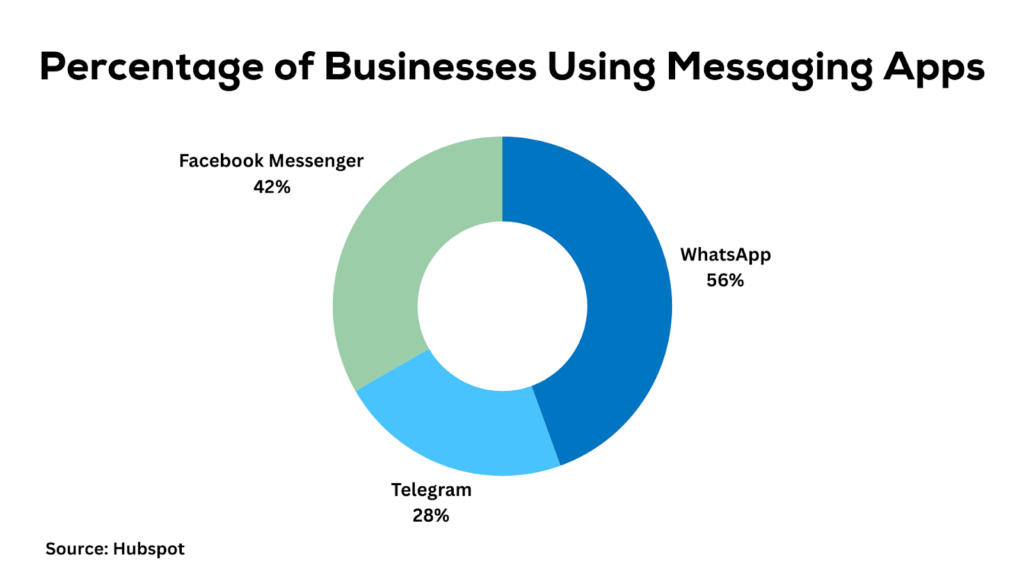Show:
How Does Integrating Telegram and WhatsApp Enhance Communication?

In our digitally connected world, effective communication has become the backbone of business success. As messaging apps continue to shape how we interact, smart companies are leveraging these platforms to streamline operations, engage customers, and drive growth.
Telegram and WhatsApp stand out as powerhouses among the various options, each offering unique strengths. But what if you could harness the combined power of these two titans? This blog post explores how integrating Telegram and WhatsApp can enhance business communication.
The Rise of Telegram and WhatsApp: A Closer Look
Before discussing the benefits of Telegram WhatsApp integration, let’s first understand the distinguishing features of these platforms.
Telegram: Speed, Security, and Functionality
Telegram users have witnessed explosive growth boasting over 800 million monthly active users globally as of 2024. Its focus on speed, security, and functionality has made it a favorite among tech-savvy users and businesses.
- No Phone Number Required: Unlike WhatsApp, Telegram doesn’t require linking accounts to phone numbers. Instead, it uses usernames, allowing for anonymity and personalized brand interactions.
- Cloud Syncing: Telegram’s cloud syncing ensures access to messages across devices, facilitating seamless team communication for users and businesses alike.
- Unique Features: Telegram offers unique features such as limitless server storage, multi-platform support, and media compression, making it a versatile tool for businesses.
WhatsApp: Unparalleled User Base
With approximately two billion monthly active users worldwide, WhatsApp remains a meta seamless communication. It’s the go-to platform for intimate social connections, making it an ideal channel for businesses to engage with customers.
- Widespread Adoption: WhatsApp’s user-friendly interface and extensive features have made it a household name, providing businesses with an unparalleled reach and potential for customer engagement.
- End-to-End Encryption: WhatsApp boasts end-to-end encryption on all communication modes, ensuring that messages, calls, and media shared through the platform are secure and private.
- Business Tools: WhatsApp offers business-specific tools such as catalogs, automated messages, and the WhatsApp Business API, enabling businesses to streamline customer interactions.
By integrating both Telegram and WhatsApp, companies can establish an omnichannel presence, reaching a wide spectrum of mobile users and catering to their unique communication preferences.
An Integrated Telegram and WhatsApp Strategy
Integrating these two instant messaging giants is about more than just technology; it’s about creating a cohesive communication strategy that aligns with your business goals and resonates with your audience. Connecting a Telegram WhatsApp integration can be the first step toward achieving this unified approach.
The adoption of messaging app stats for business communication is on the rise. According to HubSpot Research, a significant percentage of businesses are already leveraging popular messaging platforms:

This data highlights the growing trend of businesses embracing instant messaging apps like WhatsApp and Telegram to streamline communication and engage with customers more effectively.
1. Unified Branding and Messaging
- Adopt Cross-Platform Strategies: Maintain consistent branding and messaging across both platforms for a seamless user experience.
- High-Quality Support: Provide top-notch support and prompt responses on both Telegram and WhatsApp to reinforce your brand’s commitment to exceptional customer service.
2. Streamlining Internal Communication
- Seamless Employee Coordination: Connect Telegram and WhatsApp to enable employees to message each other seamlessly using their preferred app, fostering collaboration and efficiency.
- Cross-Department Collaboration: Share information and files across departments and offices with ease, breaking down communication silos.
3. Elevating Customer Service
- Direct Customer Engagement: Reach more customers directly through their preferred secure instant messaging app, whether it’s Telegram or WhatsApp, on all their devices.
- Faster Response Times: Respond to customer queries more quickly, enhancing overall satisfaction and loyalty.
- Convenience for Users: Give customers the freedom to engage with your brand through the app they’re most comfortable with.
4. Streamlining Partner and Supplier Communication
- Synced Conversations: Ensure that discussions with partners and suppliers are consistent across cross-platform software eliminating potential misunderstandings.
- Efficient Procurement and Collaborations: Teams can easily reference older discussions without losing context, facilitating smoother operations.
5. Boosting Teamwork and Collaboration
- Unified Messaging Platform: Integration offers a unified messaging solution for teams using a combination of Telegram, WhatsApp, or other messaging apps, promoting seamless collaboration.
- Enhanced Collaboration: Teams can work together seamlessly, regardless of their preferred platform, fostering a more connected and productive work environment.
Ensuring Security and Compliance
As businesses integrate Telegram and WhatsApp, it’s crucial to address security and compliance considerations to protect sensitive information and adhere to legal requirements. With the growing concern over data privacy and cybersecurity threats, companies must prioritize robust security measures and stay compliant with relevant regulations.
Telegram employs its proprietary MTProto encryption protocol, offering security for various communication modes, including cloud chats, secret chats, and voice calls. However, it’s important to note that end-to-end encryption is not enabled by default in Telegram’s cloud chats.
Users have the option to enable it through the use of secret chats which provide an additional layer of security by encrypting messages on the sender’s device and decrypting them on the recipient’s device, ensuring that no third party, including Telegram, can access the content.
When integrating Telegram and WhatsApp, businesses should carefully evaluate their security requirements and implement appropriate measures to ensure the protection of sensitive information. This may involve enabling end-to-end encryption in Telegram for specific conversations or channels or relying primarily on WhatsApp for communications that require the highest level of security.
Leveraging Bots and Automation
One of the key advantages of integrating Telegram and WhatsApp is the ability to leverage bots and automation to streamline operations and enhance customer service.
Telegram’s open-source nature and robust API allow businesses to create custom bots tailored to their specific needs. These bots can be programmed to automate tasks, handle inquiries, provide quick responses, and even integrate with existing systems and workflows.
For example, a business could develop a Telegram bot to automate order processing, customer support, or marketing campaigns, ensuring efficient and timely communication with customers and stakeholders.
While WhatsApp’s bot capabilities are more limited compared to Telegram, the platform offers the WhatsApp Business API, which enables businesses to unlock the potential for large-scale communication, automated responses, and seamless integration with existing business processes.
By utilizing the WhatsApp Business API, companies can automate various aspects of customer service, marketing, and workflow optimization ensuring efficient and personalized interactions with customers on a global scale. Here’s a tabular column format for comparing messaging app features:
Cost and Pricing
| Feature | Telegram | |
| End-to-End Encryption | Yes (Optional) | Yes (Default) |
| User Interface (UI/UX) | Intuitive design, customization options | Customizable themes, clean interface |
| Group Calls | Yes | Yes |
| File Sharing | Yes ( Up to 2 GB) | Yes (100MB) |
| Bots and Automation | Yes | Yes |
| Cloud Storage | Yes (Unlimited) | No (Works for Premium version) |
| Cost and Pricing | Free (Subscription for Business feature) | Free (Subscription for Premium version) |
This table provides a structured comparison of key features across various messaging apps, allowing users to make informed decisions based on their specific requirements and preferences.
Compliance and Legal Considerations
As businesses embrace the integration of Telegram and WhatsApp, it’s essential to navigate the legal landscape and ensure compliance with relevant regulations, such as the General Data Protection Regulation (GDPR) and the California Consumer Privacy Act (CCPA).
Telegram and WhatsApp have different approaches to data retention and user privacy. Businesses should thoroughly understand these policies to ensure compliance with applicable regulations and meet their own data privacy and security requirements.
Telegram’s approach to data retention is relatively straightforward: the platform stores user data on its servers until the user deletes it. However, Telegram does not have access to the content of secret chats due to their end-to-end encryption.
GDPR and CCPA Implications
The GDPR and CCPA have specific requirements related to messaging apps and user data privacy. Businesses must ensure transparency, obtain user consent, and provide opt-out options when integrating Telegram and WhatsApp into their communication strategies.
Compliance with these regulations involves implementing robust data protection measures, conducting regular privacy impact assessments, and maintaining clear and accessible privacy policies. Failure to comply with these regulations can result in significant fines and reputational damage.
By addressing security considerations, leveraging bots and automation responsibly, and adhering to legal and compliance requirements, businesses can unlock the full potential of integrating Telegram and WhatsApp while protecting sensitive information and maintaining trust with their customers and stakeholders.
Embracing the Future of Business Communication
Integrating Telegram and WhatsApp isn’t just about adapting to the digital age – it’s about thriving in it. By harnessing the combined power of these messaging giants, businesses can create meaningful connections, foster engagement, and drive success in the mobile-first era.
Take the first step towards elevating your communication strategy by exploring integration solutions tailored to your business needs. Embrace this opportunity to streamline operations, enhance customer experiences, and stay ahead of the curve in an ever-evolving digital landscape.
Frequently Asked Questions
1. Does the Telegram-WhatsApp integration work on mobile and desktop?
Yes, the integration works seamlessly across both mobile and desktop environments, allowing users to switch between devices without disruption.
2. How can small businesses benefit from Telegram and WhatsApp integration?
Small businesses can utilize unified messaging solutions to manage customer communication across both platforms. Start by focusing on core messaging and engagement capabilities rather than advanced features.
3. What are the differences in audience engagement between Telegram and WhatsApp?
While WhatsApp is ideal for intimate, personal connections, Telegram offers a platform for open expression and public engagement. Businesses should tailor their approach based on the nuances of each platform’s audience.

 Return to Previous Page
Return to Previous Page








